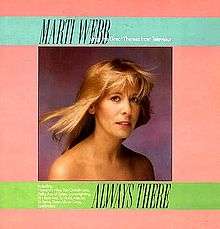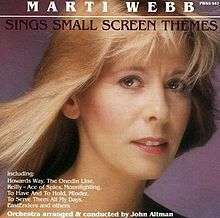Always There (album)
| Always There (LP) | ||||
|---|---|---|---|---|
 | ||||
| Studio album by Marti Webb | ||||
| Released | 1986 | |||
| Genre | Theme music | |||
| Label | BBC Records | |||
| Producer | Bruce Talbot & John Altman | |||
| Marti Webb chronology | ||||
| ||||
| Marti Webb Sings Small Screen Themes (CD) | |
|---|---|
 | |
| Studio album by Marti Webb | |
| Released | 1988 |
| Label | BBC Records |
Always There is the fifth solo album by Marti Webb (born 13 December 1944, Hampstead, North West London), a musical actress from England issued in 1986 on the BBC Records label. It consisted of themes from television shows that had been given lyrics. The title track “Always There” reached #13 in the UK singles chart. The album, which peaked at #65 in the UK Albums Chart,[1] was released in 1988 on compact disc entitled “Marti Webb Sings Small Screen Themes”.
Track listing
Side 1
- "Always There” (Simon May/Don Black/Leslie Osborne) – Theme from “Howard’s Way”
- "To Have and to Hold" (John Worth) – Theme from “To Have and to Hold”
- "He’s Not You (Chi Mai)” (Ennio Morricone/Don Black) – Theme from “The Life and Times of David Lloyd George”
- "I Could be so Good For You" (Patricia Waterman/Gerald Kenny) – Theme from “Minder”
- "It’s Still the Same Dream" (Kenyon Emrys-Roberts/Don Black) – Theme from “To Serve Them All My Days”
- "Anyone Can Fall in Love" (Simon May/Don Black/Leslie Osborne) – Theme from “Eastenders”
Side 2
- "Someday Soon” (Khachaturian, Arr. John Altman/Don Black) – Theme from “The Onedin Line”
- "Cheers" (Gary Portnay/Judy Hart Angelo) – Theme from “Cheers”
- "No One Will Ever Know You" (Shostakovich, Arr. Robinowitz/Don Black) – Theme from “Reilly, Ace of Spies”
- "Moonlighting" (Al Jarreau/Lee Holdridge) – Theme from “Moonlighting”
- "I Don’t Hurt Anymore" (Richard Rodney Bennett/Don Black) – Theme from "Tender is the Night”
- "Only Love" (Vladimir Cosmo/Norman Gimbel) – Theme from “Mistral’s Daughter”
Production
- Orchestra arranged and conducted by John Altman
- Harmonica and extra vocals by Paul Jones (Side 1, Track 4 & Side 2, Track 2)
- Produced by Bruce Talbot and John Altman.
- Engineered and mixed at Angel Studios by John Timperley
- Assistant engineer Gary Thomas
References
- ↑ Roberts, David (2006). British Hit Singles & Albums (19th ed.). London: Guinness World Records Limited. p. 594. ISBN 1-904994-10-5.
This article is issued from Wikipedia - version of the Monday, November 02, 2015. The text is available under the Creative Commons Attribution/Share Alike but additional terms may apply for the media files.